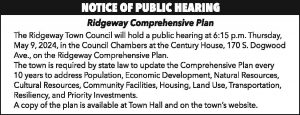Fear of Shortfall Prompts Millage Discussion
BLYTHEWOOD – During Town Council’s annual retreat on Saturday, an agenda item titled ‘Revenue Issue’ turned out to be a presentation by Town Administrator Gary Parker to prepare the citizens of Blythewood for a property tax in the not too distant future.
Parker reviewed a laundry list of the Town government’s increasing financial burdens along with ways the town’s citizens would benefit from a property tax. More to the point, however, he told Council members, “We don’t know exactly where we stand until we get into the budget workshop for this coming year. My fear is that we are going to see a shortfall already in the coming year.”
Parker said that while a shortfall would not mean the Town won’t be able to sustain services in the upcoming budget year with current revenues, “we can’t sustain the Town’s operation in future years unless we have additional revenue sources,” he said.
While Parker laid the need for additional revenue squarely at the feet of projected growth (25,000 population by 2025, according to the town’s Master Plan), Councilman Tom Utroska cast doubts on the numbers with his own collection of previous growth prognostications, one of which put the town’s population at 10,000 by 2015. According to the U.S. Census Bureau’s annual estimates of the resident population (released for municipalities in May 2014), Blythewood had only 2,298 residents as of July 1, 2013.
“We don’t have a property tax in Blythewood,” Parker said. “Consequently, we are trying to fund services through other very limited revenue sources.”
However, services currently provided in the Town of Blythewood (such as police and fire protection, garbage collection, water, sewer and power services) are provided by Richland County through Intergovernmental Agreements (IGA’s) or through other municipal or privately owned utilities. Parker suggested growth would eventually be a contributing factor “down the road” in the need to levy a property tax in the town.
At one point, Utroska, who made it known he was not in favor of levying a property tax on the citizens, brought the call for a tax full circle back to the various financial tribulations of the park and Manor (see story, page 1).
“The real equation we have is with the town park and The Manor,” Utroska said during heated comments about the proposed property tax. “As long as we continue to provide more and more stuff for the park and Manor, the deeper we’re going to go into debt. We need to neutralize expenses at the Manor. A hundred residents went to a town meeting and said this would happen.”
In addition to Utroska, Council members Bob Massa and Bob Mangone also expressed opposition to levying a property tax.
Before he would agree to levy such a tax, Massa said he would pose two questions to the citizens in the form of a public referendum (vote): 1) Are you in favor of a small millage to maintain the park? 2) Are you in favor of a small millage to maintain the roads in the town (those owned by the Town government)?
Utroska said he wanted the citizens to have a say in whether they would support a property tax. He also said he didn’t want to pass a tax until there is a specific need for one. Mangone added that while he had not campaigned against levying property taxes, as such, he told Council that he did say during his campaign, “I have never voted for a tax increase and couldn’t imagine doing that in the future.”
“Three of us (himself, Massa and Utroska) ran on platforms aimed against continuing building the park and Manor,” Mangone added. “I’ll be chained to the graders before I see a penny (of public money) spent on the amphitheater. The park foundation can raise private money to build it, but until we can meet the basic needs of the citizens I can’t justify spending town money on the amphitheater.”
It was just last month, however, that Council voted unanimously to give the park foundation $3,000 for seed money.
Parker disagreed that the citizens should be polled on a property tax.
“The people elected the Council to make decisions for them,” Parker said. “Council members are the ones who really have the knowledge and information about whether or not a (property) tax is needed. If you put it on the ballot, the (people’s) knee jerk reaction will be ‘No.’ But people don’t understand all the costs that are involved in a municipal operation that the governing body understands. That’s why they elect Council members – to represent them. A referendum on a property tax would endanger support for it. You as elected officials should make that decision.”
“I don’t dismiss what you’re saying,” Mangone told Parker, “but saying the citizens don’t understand, and that Council knows what’s best – that’s what got the last group un-elected.”
In the end, Parker managed to get Council’s buy-in for what he called a good, very expensive public education effort, to convince citizens of the need for a property tax and before it is levied. Still, there are other major road blocks the Town must overcome before actually levying a property tax, specifically Act 388, passed by the state legislature in 2006 that has thus been interpreted by the S.C. Attorney General’s office: if a municipality does not currently have a property tax, it can never have one. The Act 388 formula amounts to “0 existing millage rate multiplied by annual percentage of permitted millage rate increase = 0.”
Blythewood is one of a handful of towns in the state that does not have a millage, much less a property tax. The Amoth administration voted to do away with it in 2004. Without a millage, the Town cannot, under Act 388, legally establish a millage and levy taxes.
The intent of the law has long been questioned by the Municipal Association of S.C. (MASC), and Parker suggested that Council, with the help of MASC, find out once and for all whether the legislature in passing Act 388 actually intended for a Town without a millage to never be able to have one. Council agreed that would be a good idea before asking voters to support a property tax.
Other ways suggested to increase the town’s revenue included issuing debt millage, which Parker said the Town would be allowed to do under Act 388 (such debt millage could be issued with General Obligation (GO) bonds); levying impact fees on developers and bringing in more industry into the town which Parker said would provide a greater ratio of revenue than that provided by residences.
Parker pointed out, however, that impact fees could only be used for capital improvements, not for the Town’s operations and maintenance expenses. And even if the Town did pass an ordinance to issue a GO bond, which must be paid for with property taxes, voters would have 20 days, from the date of publication of the Notice of Adoption of the GO bond ordinance, to meet certain requirements to force Council to either rescind the bond ordinance or vote to hold a public referendum on it.










